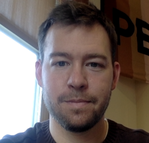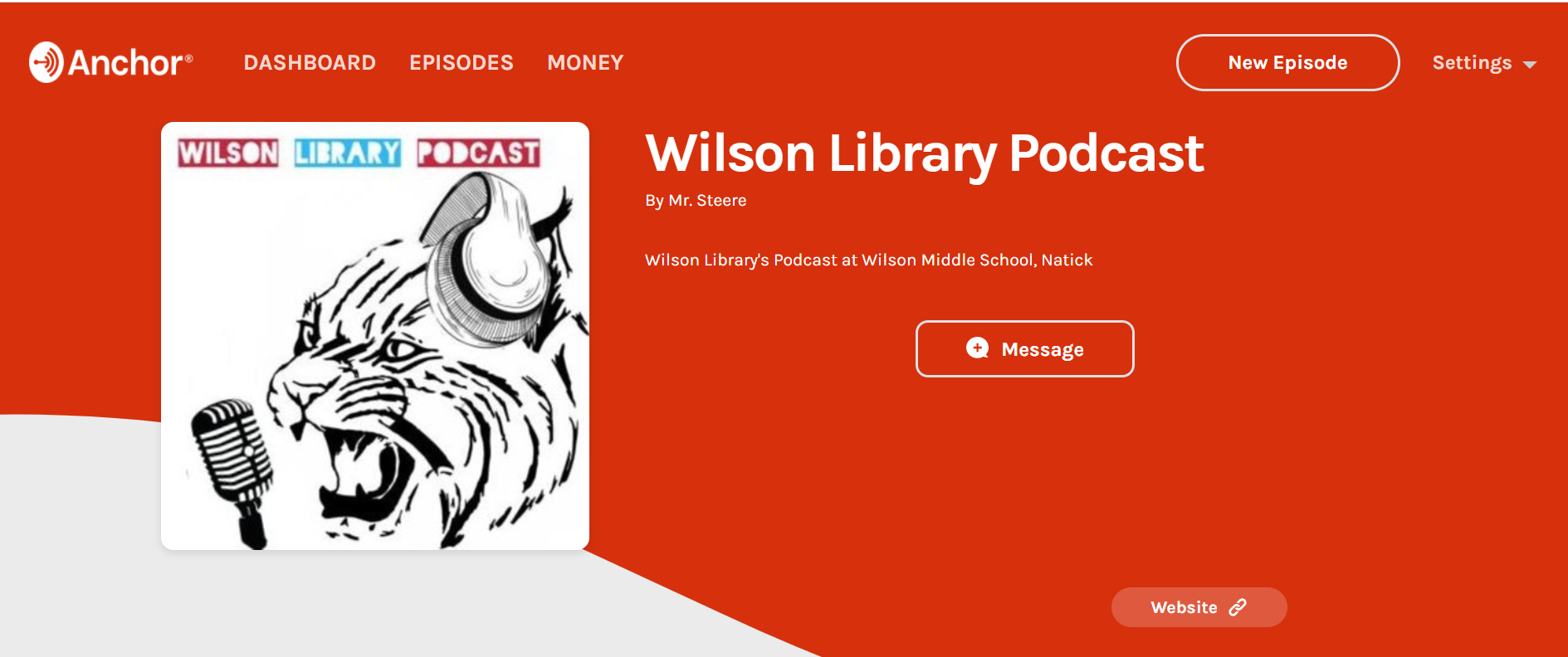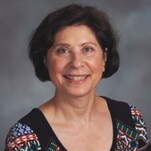Luke Steere, Librarian |
In February of 2020 we released our first episode on Anchor.fm. The focus was on the production of the school play, Frozen Jr., which had just opened. We interviewed cast members and recorded actors' personal reflections. One student read a snowboarding poem. Someone reviewed a book. The episode was entirely student-brainstormed, -voiced, and -produced. A month later, Natick went fully remote. After a few weeks of meeting intermittently and attempting to settle on a time when we could all be together, the advisory committee came up with a new tagline: “The Wilson Library Podcast, a way to stay socially connected even though we are physically distanced.” Without the ability to maintain the physical space, our club went digital, and released episodes in April and June. Natick began 2021 in a hybrid model, and now our club meets on Mondays at 3 p.m. via Google Meet. We have some new members, but the core of last year’s podcasters has returned. Episode 4 dropped in November, introducing new segments geared toward getting more of our community members involved.
Since that release, listenership has gone up. The more students that are involved, the more people tend to listen. Our faculty is the biggest audience right now and just before writing this, I received audio from an interview with a teacher -- the first for our podcast. Episode 5 is currently in production and we are always looking to improve on what came before. Here is what a few Library Advisory Committee members say about their collaborative efforts:
Lily: “I think it provides a fun way to stay connected during this time. It is also super fun to listen to! I love other people's ideas and love being able to listen to the finished product.”
Claire: “The podcast provides entertainment to the community of Wilson, but also insight into different topics that not everyone is familiar with. The podcast gives me a fun project to work on, and it is something I can look forward to.”
Finn: “This project provides chances to get together to work on something and it gets the advisory group together and we all participate.”
There are many ways to reflect and celebrate the community of your school through the library, and if you would like to get started with a podcast, here are some nuts and bolts from my experience:
- You don’t need a lot of supplies:
- Google Docs is a collaborative planning document and students are familiar with it at Wilson. Our script and ideas from each episode are carried over from one doc to the next. We use individual boxes for each segment (*Insert > Table > 1 x 1*) and then in between write in the host script.
- Built-in mics on Chromebooks and Macs are enough for the audio quality we’re looking for. Podcast mics are available in the $50 price range and usually have USB connections. Setting up a space for recording in your library makes for better production value.
- Most meeting programs have a record feature, so you can interview or record scripts by capturing the video and then pulling into an audio program. Our district provides a record feature on Google Meet, so I can press record and have the student speak and then drag the video file into iMovie and export as a sound file.
- If your computer doesn’t have a built-in audio editing program, there are open source ones available (Audacity) and web-based ones too (Soundtrap). The Anchor.fm interface offers a lot of usability as well.
- Randomly select a host for each episode. Kids always want to host, so set the roles of the host clearly. For example, we decided the host must check the doc each meeting, insert their own script, and engage with those who are writing the other segments, so they know what they are talking about. Also, we try to limit the host’s voice on other segments within the episode.
- Try not to “date” episodes too much. Theming segments around holidays or upcoming events can be problematic as this alienates some listeners who may not be involved with the event or tradition or require the release to have a deadline. Since our podcast is created by a club that meets after classes and office hours on Mondays, it’s possible a key person will miss a meeting. It’s also possible interviewees may cancel or reschedule. Plus, there might be a myriad of technical issues that might delay the broadcast.
- Use the podcast as a platform for collaboration with teachers. The students will collaborate naturally if teachers get involved. But nothing is “out-of-bounds'' for the direction the podcast can take. Your audience is school children, and they are involved in projects all day. Draw on this for content: talk to teachers and students as you interact with them and ask them what they’re doing. Explain that it is very simple to turn something (paper, poem, research, artistic design) into an audio creation. I introduced citing from databases to the 7th grade for their RTI blocks last year and segments on basketball, natural disasters, and WWII came out. After reformatting them into scripts, a monthlong research project became a 15-minute recording session, while creative writing papers turned into segments. Also, allowing the students to reflect on their projects with their own voice adds another layer to the experience.
- Have any recorded students only use first names and ask interviewees if they are comfortable with being recorded for the podcast. A little journalism 101 goes a long way with your student creators.
- Promote library books, obviously. The book review is our longest-running segment.
- Think in terms of segments. We have an Ear Boggler, a Sports Minute, a Kids-in-the-Hall interview beat, and a creative story in most every episode. This keeps listeners coming back and keeps student creators involved. Two segments in the pipeline for Episode 5 are, “Camp Half Blood News,” -- an idea for a fan fiction news desk segment in which I have been cast as Chiron (stay tuned!) -- and “Hello Beautiful,” all about the thrilling (I am assured) world of middle school fashion.
- Get students involved off-mic. We just redesigned the new logo you can see on our Anchor page, a collaboration between Lily, Finn, and Emma. A few other students are designing posters to promote our club and podcast around school. Others are interested in audio editing, so before our next episode, I will be running an audio-editing class using Soundtrap.
- Use the podcast to foster a Growth Mindset and inclusivity. Between the planning and production, there are a lot of issues; things will go wrong and things take time. Being a role model about attention to detail and how the mission of the podcast is to include everyone is important. Being an advocate for quality content really heightens the students’ attitudes toward the project. But, most importantly, focusing on how you are not an expert either can go a long way to empowering students to speak their minds. When I talk about how a script can be modified to fit an audio-only format or try to spur thinking about what causes the podcast can promote, students often take initiative.
I always try to remind my club that we are here to have the time of our lives. I trust you will have fun listening or creating your own podcast as well. Reach out to [email protected] for any help on the above or to share your own insights.




